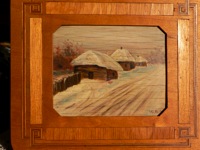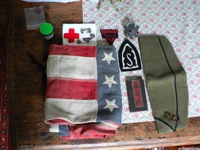
WALTER TEEUWISSEN BIOGRAPHY
Wouter-Walter Teeuwissen was born on October 1rst 1886 in Huizen in the Netherlands by the ZuiderSee. He was the second son born to his parents.
His father was a baker. His mother died when he was 18 months old and his father remarried and had two more sons. As a child, he had told an old friend of the family that he wanted to become a preacher. When he talked about it to his stepmother, she said “ Who do you think you are? You will go into apprenticeship at the age of thirteen like everybody else !” and she found him a place in Bussum as an apprentice to learn how to make cigars. At the age of 18, he received enough money from his father to open up a cigar shop in Huizen.
At the age of 20, Wouter decided to emigrate to the States and he sold his shop. He wrote an account of his crossing in verse in Dutch. (Mijn Reis)
He sailed from Rotterdam on the SS Nieeuw Amsterdam and arrived in the States in New York on September 14th 1908 with $80 in cash. The address he gave in the States was “a friend, Mr. R. Diephuis, Route 6, Holland, Michigan.” He changed his first name to Walter.
He made a round trip to Huizen to visit his relatives in Holland in 1911. Before returning to Chicago. in his old store, he found the pot of glue that he used to glue the cigars he used to make. He kept two of his cigar molds all his life.
He was naturalized in Chicago in 1914.
He went to Grand Rapids, Michigan where there were a lot of Dutch. He sold his cigars with a Princess Juliana ring. At the time, he met Petronella La Grange and her husband Fred de Lange. Walter was selling his cigars at the County Fair by Reeds Lake when he attracted the attention of Susanna Drescher and one of her sisters. Susanna Drescher was born on August 31rst 1884 and grew up on her parents’ farm in Reed City. When she met Walter, she was working as a housemaid for a rich Grand Rapids family. Walter courted her, they had walks around Reeds Lake and they were married in April 1913 at the Baptist Church. The Baptists started telling him that smoking was a sin and that he should find himself another occupation than making cigars. They suggested he train as a physical therapist because he was tall and strong. He worked for some time as a male nurse for a wealthy family. He still wanted to become a pastor so he went to Moody Bible Institute in Chicago where you could be trained without having had any secondary education and he worked nights as a nurse. Later on he completed his training at a Presbyterian Seminary subsidized by Mc Cormick (of the tractor family). Then he became a YMCA secretary.
Walter and his wife had a first son, Walter Jacob, born in 1914 in Chicago, Illinois at the Passavant Hospital.
Walter became pastor at a church in Argyle, Illinois. In Rockford, there was a big military camp and he worked there as a chaplain.
Their second son Raymond Woodrow was born in November 1918 in Rockford, at the Swedish Hospital.
Walter had pledged to join the YMCA volunteers. Susanna thought that since the War was over, he wouldn’t have to go. Susanna and the two boys stayed in a Chicago suburb while Walter sailed to Japan. There is a picture of him in a rickshaw. He was part of the YMCA Polar Bear Brigade. Apparently the person in charge there sent him to Nikolsk, Ussurisk in Siberia, near Vladivostok. The American Expeditionary Force was engaged in operations in the area.
Walter Teeuwissen served as a chaplain for the Austrian-Hungarian prisoners in a Russian Prisoner of War Camp. They all lived in train freight cars in a station.
These prisoners felt they had been abandoned and they had decided that they would kill the next person that would be sent to them to supposedly help them, so that people would remember that they were actually still out there.
Walter arrived and announced that he was going to help them. That night the prisoners met to decide how to go about killing him. One of the prisoners declared that he thought Walter seemed pretty sincere and it was worth giving this man a chance to practice what he preached. There was no hurry, they had been there for two years and they could still kill him later on if he did not keep his promises. That is how Walter ended up spending two years with them.
Walter had a freight car to himself and a personal interpreter and a cook. During the time he spent in Ussurisk, he took a lot of pictures with his Kodak camera. The pictures were gathered in the “Siberia Album” which has legends of the pictures in English, Hungarian and German.
The prisoners also lived in the cars but they were crowded. Apart from, that, Walter lived the same life as them. He preached the Gospel and taught Bible classes. Walter helped organize their trip back to Hungary with the help of the YMCA and Care. The prisoners gave him a book that they had made themselves with over 2000 signatures and very beautiful symbolic illustrations. A facsimile of the book has been given to the Association of Former Prisoners of War in Hungary.
They also gave him a painting painted on wood, watercolors, carved wooden objects including boxes, picture frames and napkin rings and a gold nugget. There is also a wooden frame with a drawing of Susanna, Walter and Ray copied from a photograph.
At the end of his stay, he sailed from Yokohama on the Empress of Russia on the 8th of September 1920 and arrived in Vancouver on September 15th 1920.
When Walter arrived home in Chicago, the letter announcing his return had not arrived yet. Susanna had not seen him in two years and thought that he would never make it back. His sons did not recognize him. Walter Junior remembered getting letters from his father saying: “Take good care of Mother and little Brother Ray” quite a responsibility ! Walter Junior was seven years old when his father returned home. Some time later, in 1923, when Walter Teeuwissen was pastor in Spring Lake on Lake Michigan, he got a visit from Pastor Norton, who had come to give a conference on his chaplaincy work with the Belgian soldiers who had found themselves in England during WW1. Norton asked Walter whether he hadn’t forgotten Dutch. “Me, forget my mother tongue?” replied Walter. Norton told him “I need you in Belgium”. Susanna asked a lot of questions about Belgium, Walter had no will to go back to the Old Continent; he enjoyed living in the States. Norton insisted so much that the family moved to Bruges. They lived at 18 Naaldenstraat. A daughter was born at Sint Jans Hospital, on March 14th 1924 at 11 AM with the help of Dr Schravel.
Walter would go to the market square and stand up on a wooden box to preach in this town where the population was mostly Catholic. The two boys left for college in the States after they each finished high school in Bruges.
In June 1940, when the Germans invaded Belgium, after having entrusted their most precious belongings to friends and buried their silverware in the garden, Walter, Susanna and their daughter were driven to Dunkirk in an ambulance to flee the country. The Dunkirk harbor was in flames and after a few hours, realizing it was impossible to cross the Channel to England, they returned to Bruges in the same ambulance. During the day when they were away, a number of items disappeared from their home. People thought they would never come back. During the summer of 1940, Walter took care of wounded English soldiers and would give them a funeral service when they died. His daughter who was sixteen years old played the organ. Sixty years later, she still remembered the wooden coffins, the liquid that would seep through on the way to the cemetery and the stench in the heat of the summer.
They stayed in Bruges for a few more months until the American Consulate told them that it would be best for them to leave the country. Walter sold the Friesian clock, which was the only thing he had inherited from his father to a rich man who had a cheese store. The clock represented the Judgment of Solomon. Walter, his wife and daughter obtained a safe-conduit and left with one suitcase each by train through occupied France. Susanna took her Limoges tea set and their daughter left her beloved books behind and chose to take an extra pair of shoes. They were not allowed to get off the train until they reached Portugal where they embarked in Lisbon on November 9th 1940 on the SS Extavia a cargo ship and sailed to Wilmington, Delaware where they arrived on November 25th 1940.
They settled in Michigan where Walter had a number of churches and eventually Grand Rapids. Susanna died in May of 1958. Later on, he was remarried to Petronella de Lange who had become a widow. He died in Grand Rapids on October 7th 1967.
In 2002, the daughter of the man who had bought the Friesan clock sold it back to the Teeuwissen family.





